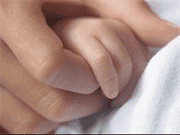Lillian’s Security Blanket:
A Cooling Device to Treat
Oxygen-Deprived Babies
 Lillian Keller donned a pink bathing
suit and took her first aquatic therapy
class. Six months earlier, she took her
first steps. Before that, on her first birthday,
she swallowed food for the first time
— a delicious piece of birthday cake. These
firsts would be milestones for any child.
But for Lillian, they are especially sweet,
in part because none of these achievements
would be possible without a clinical trial at
The University of Texas Medical School at
Houston that gave her a second chance at life.
Lillian Keller donned a pink bathing
suit and took her first aquatic therapy
class. Six months earlier, she took her
first steps. Before that, on her first birthday,
she swallowed food for the first time
— a delicious piece of birthday cake. These
firsts would be milestones for any child.
But for Lillian, they are especially sweet,
in part because none of these achievements
would be possible without a clinical trial at
The University of Texas Medical School at
Houston that gave her a second chance at life.
Lillian was clinically dead when she was born. She wasn’t breathing. She had no heart beat. Doctors lost fetal monitoring during the emergency delivery, so no one knew if this baby girl had been deprived of oxygen for 60 seconds or 23 minutes.
Quickly, the physicians at West Houston Hospital revived Lillian, but the prognosis was grim. Every shred of optimism the medical staff shared with the family had to be tempered by the very real possibility that Lillian would die again or be severely brain damaged.
A doctor at the suburban hospital was familiar with hypothermia research that neonatalogists were conducting at the UT Medical School’s two teaching hospitals. He told Lillian’s father, Don Keller, that he thought the cooling blanket used in the clinical trial was Lillian’s best hope for survival.
“He assured me the blanket wasn’t going to make it worse,” Don recalls.
Lillian was airlifted to the neonatal intensive care unit at Children’s Memorial Hermann Hospital and became one of 208 babies to be enrolled in a multicenter trial that examined the effectiveness of cooling therapy for oxygen-deprived babies.
“She had one of the worst medical histories I had ever seen. We were worried she wasn’t going to live,” says Brenda Morris, MD, associate professor in the Department of Pediatrics and affiliated with Children’s Memorial Hermann Hospital. “There was some preliminary evidence that the cooling blanket may help, so we tried it.”
For the next 72 hours, Lillian lay on the ultimate security blanket. The blanket, which is made of soft plastic filled with circulating cold water, kept her tiny body at 92ºF. Then, she was gradually rewarmed to her normal body temperature.
Jon E. Tyson, MD, a specialist in neonatal/ perinatal medicine and pediatrics, who is affiliated with Children’s Memorial Hermann Hospital, says the cooling provides a window of opportunity to protect the brain and improve outcomes for oxygen-deprived newborns.
Cold Comfort
 The Neonatal Research Network study,
which was recently published in the New
England Journal of Medicine, found that
oxygen-deprived babies who were cooled
within six hours of their birth were more
likely to survive and less likely to suffer
severe disabilities than those who received
conventional treatment.
The Neonatal Research Network study,
which was recently published in the New
England Journal of Medicine, found that
oxygen-deprived babies who were cooled
within six hours of their birth were more
likely to survive and less likely to suffer
severe disabilities than those who received
conventional treatment.
“There was about a third reduction in death, and of those who survived, there was about a third reduction in disability,” says Tyson, the principal investigator at the Houston site. “I think this is by far the most promising therapy we’ve had for babies with this problem.”
The therapy is still considered experimental, but Tyson says this is “the first hope for a major advancement.” The evidence, he adds, demonstrates that clinical trials are essential to the health of the country.
When Tyson checks on his patients, he sports a “Research Saves Babies” button on his white coat. Lillian’s parents and her three siblings are believers in that message.
“We were told she could have brain damage, die or just have really bad test scores when she’s older,” her mother, Sally Keller, says. “There are a lot of circumstances surrounding her birth that were miraculous, and the blanket was one of them. Because of that, she’s made incredible strides.”
Lillian, now 4, appears to have no mental deficits. She knows her alphabet and is attending preschool. She follows along in books as her oldest sister, Cora, reads to her. She can reason. As her parents can attest, she can argue.
Her motor skills were delayed, and she requires weekly physical therapy to improve her coordination, but doctors predict she’ll have no long-term disabilities.
“Given the start that she had, it’s clear the cooling therapy had a benefit,” Morris says. “Without this therapy, you wouldn’t expect a baby who is walking and talking.”
Don Keller says the cooling blanket had a huge impact on the life of his daughter and other infants in the trial. “At least once a month, she’ll do something new or she’ll argue with me and I think, ‘Wow, I almost didn’t have this,’” Keller says. “‘I almost didn’t have this little girl. How am I so blessed?’”
Adapted from a story in Health Leader, an online publication from the University of Texas Health Science Center at Houston. For more articles like this one, visit healthleader.uthouston.edu.

